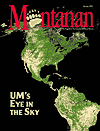
Spring 2001
CONTENTS
Championship Game
Not Your Average Joe
I've Seen Fire and I've Seen Rain
Back Roads Fever
AROUND THE OVAL
LETTERS TO THE EDITOR
BOOKS
SPORTS
CLASS NOTES
ALUMNI NOTES
Contact Us
About the Montanan
PAST ISSUES
by Joyce H. Brusin
The events of Winter Range, Claire Davis' first novel, take place in northeastern Montana during a few short weeks at the close of an unusually long and snowy winter. A rancher, haunted by bitterness and the stunted expectations of a cruel father, has run out of money, good credit and the regard of his neighbors. Totally absorbed in his own demise, he decides to starve his sizable cattle herd to death rather than accept charity or interference in its care. When the local sheriff stumbles upon the first frozen carcasses one cold night, the tightly knit ranching community must find a way to balance the demands of conscience with their long-held belief in a rancher's rights of ownership.
"Youth is a tender terror. Even the young will tell you so, improvising on their lives as on parlor pianos, stuttering out a boogie-woogie somewhere in the mess of ivory they've found themselves at." So begins "Blame It On My Youth," one of eleven stories in this debut collection. The lovely lyricism of these pieces allows a pronounced and insightful humanity to rise up from the page. In the title story, a motherless boy examines the Mercedes his father has just purchased in the latest of many gala spending sprees. "When I climbed inside for the first time, it had the warmth and lush smell of a sultan's litter. It was deep red, the color of an all-day sucker, and if you secretly licked it when your father wasn't looking, you could imagine it tasted sweet beneath the fuzz of pollen."
In "The Art of Eating," a mother relocates to Seattle from Montana and settles in for a time with her thirty-something son and his boyfriend. While growing to appreciate the culinary experiments of her son's lover, she searches for work among the aged and is astonished to encounter there a nearly-Proustian obsession with the taste of food and its recollections, both cherished and terrifying. All of these stories look squarely and compassionately at the ways society's outsiders compose the music of their lives.
From its opening pages this mesmerizing book delivers on its promise to explore the landscape of family. An inventive and courageous mix of memoir and fiction, it is fueled by the author's determination to explore the legacy of his adoptive mother's Alaskan childhood — a childhood that included her own adoption at an early age. The book is broken up into sets of vignettes, half depicting Chisholm's recollections of his northern California childhood and the visit he makes as an adult to his mother's home village; the other half are fictionalized accounts of what he imagines life was like for his half-native mother's ancestors on an Alaskan river delta. Interwoven in the narratives are lush descriptions of the literal landscapes in which he and his mother grew up. Searching for their grandfather's wilderness grave, his brother alerts him, "'Colin, you won't believe . . .' And I don't. Before us, the tundra turns from red and yellow to undulating orange, the sun just dropping below distant, snowcapped hills. We had grown up in mountains, where winter alpenglow had tinted our skin shades of indigo and pink, and we had stood on high Sierra peaks and gazed into the gray-green deserts of Nevada. But we have never seen so far. From this lowly hill, a few hundred feet above the sea, we see the curves of the earth. We stand as if sea-bound, the tundra transformed into waves of orange that drain off the horizon like water cascading into a bottomless sky." Vivid emotional landscapes are depicted as well. With unflinching straightforwardness Chisholm relates his struggles with the distance that eventually grew between him and his mother. He attributes much of it to her struggles with identity. In one vignette he muses on her "subtle alcoholism" and how it infiltrated the daily life of her family. "I was a child then; now I see that the woman who raised me was not wholly the woman I understood her to be. This isn't to say she had no substance; on the contrary, she had too much, like a sunrise that cannot last the day. She couldn't share with me who she was because she wasn't sure herself." Ultimately, it is the collective memory of his mother's culture — vivid scraps of recollection — that creates a story peopled convincingly by both the living and the dead.
Blood Memory
Neile Graham published her first collection of poetry, Seven Robins, in 1983 while still a graduate student at UM. In this, her third book, she writes in dramatic monologues and stately, intelligent lyrics of how women have made paths for themselves in the world.
Heat. Our last night
We've said goodbye
This place is too tangled
But at six a.m. this is home
AROUND THE OVAL• SPORTS • CLASS NOTES • ALUMNI NOTES FEEDBACK•STAFF • ABOUT THE MONTANAN •ARCHIVES HOME • CONTENTS
|